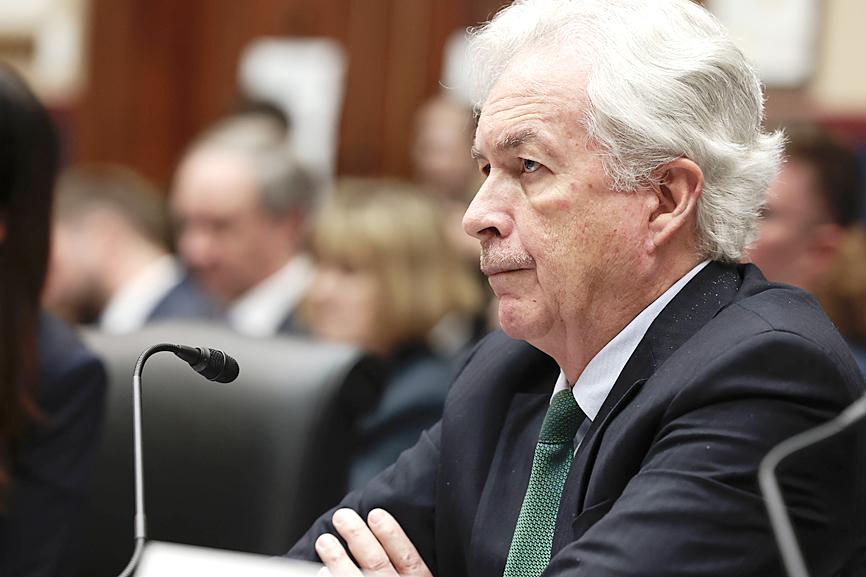CIA Director William Burns on Tuesday said that Russia’s military struggles in Ukraine and the force of Western sanctions had “unsettled” China, but warned that Washington should not underestimate Beijing’s determination to force unification with Taiwan.
Burns made the assessment at an annual US House of Representatives Permanent Select Committee on Intelligence hearing on worldwide threats, which was also attended by several other intelligence chiefs.
While “the partnership between Russia and China has strengthened since 2019, [Chinese] President Xi [Jinping, 習近平] and the Chinese leadership are a little bit unsettled by what they’re seeing in Ukraine,” Burns told the committee.

Photo: AFP
China did not anticipate the difficulties that the Russians were going to run into in Ukraine, and is concerned by the “reputational damage” coming from its close association with Russian President Vladimir Putin, Burns said.
Beijing is also worried about the conflict’s effects on the global economy, coming at a time when China’s annual growth has slowed, as well as the way it has driven Europeans and Americans closer together, he said.
Despite these concerns, “I would not underestimate President Xi and the Chinese leadership’s determination with regard to Taiwan,” although the conflict might change the “Chinese calculus” on the issue, Burns said.
US Director of National Intelligence Avril Haines said that the Western response, in terms of its unity and the impact of the sanctions, demonstrates to China “the seriousness with which we would approach an infringement on Taiwan.”
During the hearing, several lawmakers asked whether Russia’s invasion of Ukraine would embolden China to launch an attack on Taiwan, and what the US could do to prevent it.
US Defense Intelligence Agency Director Scott Berrier said he believed that Taiwan and Ukraine are “two different things completely,” not least because of the strength of the US “deterrence posture” in the Pacific.
Haines, whose agency publishes the US intelligence community’s annual threat assessment report, said that China remains an “unparalleled priority,” while Russia, Iran and North Korea also represent pressing threats to US national interests.
China, in particular, excels at “bringing together a coordinated, whole-of-government approach” to demonstrate its strength and pressure its neighbors into accepting its positions, including its claims of sovereignty over Taiwan, she said.
“China would prefer coerced unification that avoids armed conflict, and it has been stepping up diplomatic, economic and military pressure on [Taiwan] for years to isolate it and weaken its confidence in its democratically elected leaders,” Haines said.
“At the same time, Beijing is preparing to use military force if it decides this is necessary,” she added.

‘TAIWAN-FRIENDLY’: The last time the Web site fact sheet removed the lines on the US not supporting Taiwanese independence was during the Biden administration in 2022 The US Department of State has removed a statement on its Web site that it does not support Taiwanese independence, among changes that the Taiwanese government praised yesterday as supporting Taiwan. The Taiwan-US relations fact sheet, produced by the department’s Bureau of East Asian and Pacific Affairs, previously stated that the US opposes “any unilateral changes to the status quo from either side; we do not support Taiwan independence; and we expect cross-strait differences to be resolved by peaceful means.” In the updated version published on Thursday, the line stating that the US does not support Taiwanese independence had been removed. The updated

‘CORRECT IDENTIFICATION’: Beginning in May, Taiwanese married to Japanese can register their home country as Taiwan in their spouse’s family record, ‘Nikkei Asia’ said The government yesterday thanked Japan for revising rules that would allow Taiwanese nationals married to Japanese citizens to list their home country as “Taiwan” in the official family record database. At present, Taiwanese have to select “China.” Minister of Foreign Affairs Lin Chia-lung (林佳龍) said the new rule, set to be implemented in May, would now “correctly” identify Taiwanese in Japan and help protect their rights, the Ministry of Foreign Affairs said in a statement. The statement was released after Nikkei Asia reported the new policy earlier yesterday. The name and nationality of a non-Japanese person marrying a Japanese national is added to the

AT RISK: The council reiterated that people should seriously consider the necessity of visiting China, after Beijing passed 22 guidelines to punish ‘die-hard’ separatists The Mainland Affairs Council (MAC) has since Jan. 1 last year received 65 petitions regarding Taiwanese who were interrogated or detained in China, MAC Minister Chiu Chui-cheng (邱垂正) said yesterday. Fifty-two either went missing or had their personal freedoms restricted, with some put in criminal detention, while 13 were interrogated and temporarily detained, he said in a radio interview. On June 21 last year, China announced 22 guidelines to punish “die-hard Taiwanese independence separatists,” allowing Chinese courts to try people in absentia. The guidelines are uncivilized and inhumane, allowing Beijing to seize assets and issue the death penalty, with no regard for potential

‘UNITED FRONT’ FRONTS: Barring contact with Huaqiao and Jinan universities is needed to stop China targeting Taiwanese students, the education minister said Taiwan has blacklisted two Chinese universities from conducting academic exchange programs in the nation after reports that the institutes are arms of Beijing’s United Front Work Department, Minister of Education Cheng Ying-yao (鄭英耀) said in an exclusive interview with the Chinese-language Liberty Times (the Taipei Times’ sister paper) published yesterday. China’s Huaqiao University in Xiamen and Quanzhou, as well as Jinan University in Guangzhou, which have 600 and 1,500 Taiwanese on their rolls respectively, are under direct control of the Chinese government’s political warfare branch, Cheng said, citing reports by national security officials. A comprehensive ban on Taiwanese institutions collaborating or